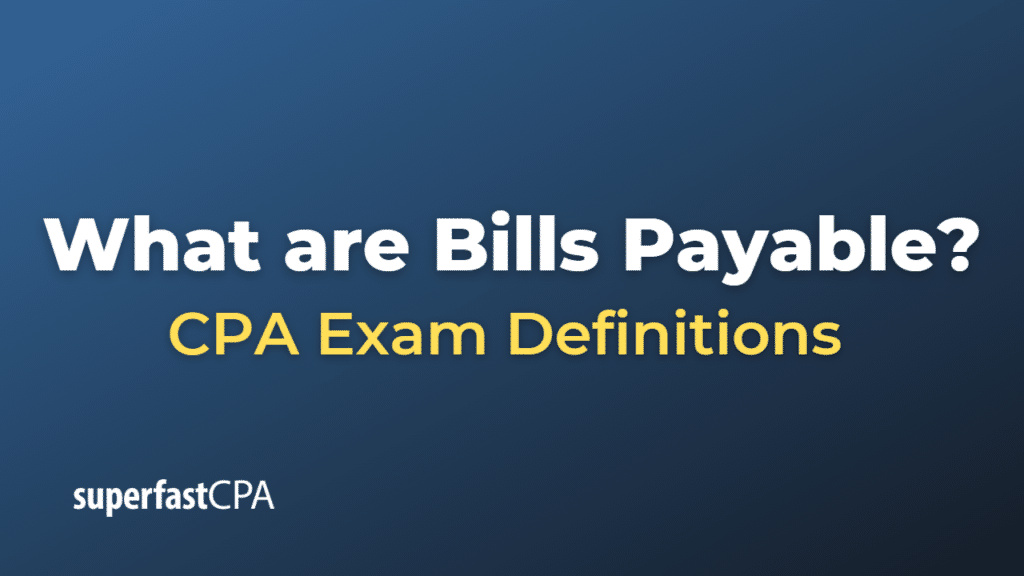Bills Payable
Bills payable, also known as accounts payable, is a financial accounting term that represents the amounts owed by a company to its suppliers, vendors, or other creditors for goods or services received but not yet paid for. These amounts are short-term liabilities, typically due within a specified period, such as 30, 60, or 90 days. Bills payable appear on a company’s balance sheet as a current liability, indicating that the company is obligated to settle these debts in the near future.
Bills payable typically arise when a company purchases goods or services on credit, meaning they receive the goods or services without making immediate payment. Instead, the company agrees to pay the supplier or vendor within the agreed-upon credit terms, which are usually specified in the invoice or billing statement.
Managing bills payable is a crucial aspect of a company’s financial operations, as it involves tracking and processing payments to suppliers, vendors, or creditors in a timely and accurate manner. Proper management of bills payable can help a company maintain positive relationships with its suppliers, negotiate favorable credit terms, and optimize its cash flow.
Some key aspects of managing bills payable include:
- Recording and tracking: Properly documenting all bills payable transactions in the company’s accounting system, ensuring accurate and up-to-date records.
- Invoice processing: Verifying the accuracy of received invoices, matching them with purchase orders and delivery documents, and entering them into the accounting system.
- Payment scheduling: Determining the due dates for each bill and scheduling payments to ensure they are made on time, taking advantage of any early payment discounts or avoiding late payment penalties.
- Cash flow management: Monitoring the company’s cash flow to ensure sufficient funds are available to meet its bills payable obligations while also managing other financial needs.
- Vendor relationship management: Maintaining positive relationships with suppliers and vendors by promptly addressing any disputes, discrepancies, or issues related to invoices or payments.
Example of Bills Payable
Let’s consider a hypothetical example of bills payable for a small manufacturing company, “WidgetCo.”
WidgetCo produces widgets and needs to purchase raw materials from various suppliers to manufacture its products. The company also utilizes various services, such as utility providers and maintenance services, to keep its operations running smoothly.
In the month of April, WidgetCo receives the following invoices from its suppliers and service providers:
- Raw materials supplier “MaterialMart”: $10,000 (due in 30 days)
- Utility company “PowerPro”: $2,000 (due in 14 days)
- Maintenance services provider “MaintainCorp”: $1,500 (due in 30 days)
These invoices represent WidgetCo’s bills payable for the month of April, totaling $13,500. To manage these bills payable effectively, WidgetCo’s accounting team would perform the following tasks:
- Recording and tracking: Enter each invoice into the company’s accounting system, updating the bills payable balance and recording the respective due dates.
- Invoice processing: Verify the accuracy of each invoice by checking the billed amounts against purchase orders, contracts, or other relevant documents.
- Payment scheduling: Schedule payments for each bill according to their due dates, ensuring that funds are available to cover these payments without causing cash flow problems.
- Cash flow management: Monitor the company’s cash flow, taking into account incoming payments from customers and outgoing payments for bills payable and other expenses.
- Vendor relationship management: Address any issues or discrepancies related to invoices or payments promptly to maintain good relationships with suppliers and service providers.
By effectively managing its bills payable, WidgetCo can ensure timely payments to its suppliers and service providers, maintain positive vendor relationships, and optimize its cash flow. This, in turn, helps the company run its operations smoothly and maintain a healthy financial position.













